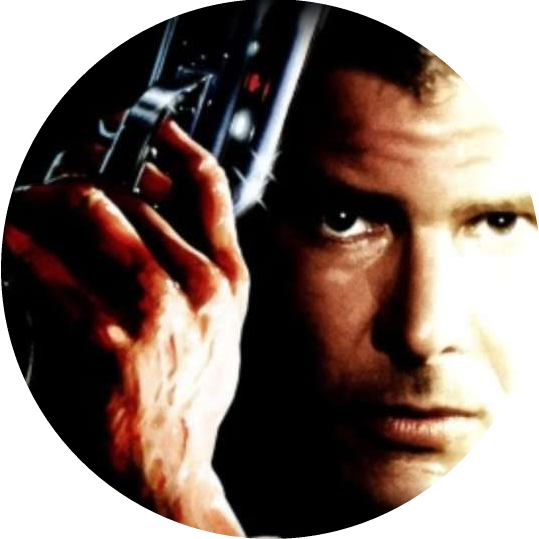It's Utterly Brilliant. It's Perfect.

Not much to say here, except that this is the single most immersive and tactile world ever created for the cinema. It's brilliant, and although I grew up with the original (voice-over, happy ending) I recently saw The Final Cut. It's the only version over which Ridley Scott had complete artistic control, and it's utterly brilliant. It's perfect. It is unquestionably the definitive version for me from now on.
Thanks to Roger Ebert for the review:: In an earlier review of "Blade Runner," I wrote; "It looks fabulous, it uses special effects to create a new world of its own, but it is thin in its human story." This seems a strange complaint, given that so much of the movie concerns who is, and is not, human, and what it means to be human anyway. Even one character we can safely assume is human, the reptilian Tyrell, czar of the corporation which manufactures replicants, strikes me as a possible replicant. And of the hero, Deckard (Harrison Ford), all we can say for sure is that director Ridley Scott has left clues in various versions of his film that can be used to prove that Deckard is a human -- or a replicant.
Now study that paragraph again and notice I have committed a journalistic misdemeanor. I have referred to replicants without ever establishing what a replicant is. It is a tribute to the influence and reach of "Blade Runner" that 25 years after its release virtually everyone reading this knows about replicants. Reviews of "The Wizard of Oz" never define Munchkins, do they? This is a seminal film, building on older classics like "Metropolis" (1926) or "Things to Come," but establishing a pervasive view of the future that has influenced science fiction films ever since. Its key legacies are: Giant global corporations, environmental decay, overcrowding, technological progress at the top, poverty or slavery at the bottom -- and, curiously, almost always a film noir vision. Look at "Dark City," "Total Recall," "Brazil," "12 Monkeys" or "Gattaca" and you will see its progeny.
I have never quite embraced "Blade Runner," admiring it at arm's length, but now it is time to cave in and admit it to the canon. Ridley Scott has released a "definitive version" subtitled "Blade Runner: The Final Cut," which will go first to theaters and then be released Dec.18 in three DVD editions, including a "Five-Disc Ultimate Collector's Edition" that includes, according to a press release, "All 4 Previous Cuts, Including the Ultra-Rare 'Workprint' Version!" plus the usual deleted scenes, documentaries, bells and whistles.
The biggest change Scott made in earlier versions was to drop the voice-over narration from the 1982 original. Spoken by Ford, channeling Philip Marlowe, it explained things on behalf of a studio nervous that we wouldn't understand the film. Since much of the interest in the film has been generated by what we weren't sure we understood, that turned out to be no problem. The ending has been tweaked from bleak to romantic to existential to an assortment of the above, and shots have come and gone, but for me the most important change in the 2007 version is in the print itself.
Scott has resisted the temptation to go back and replace analog special effects with new GCI work (which disturbed many fans of George Lucas' "Star Wars") and has kept Douglas Turnbull's virtuoso original special effects, while enhancing, restoring, cleaning and scrubbing both visuals and sound so the film reflects a higher technical standard than ever before. It looks so great, you're tempted to say the hell with the story, let's just watch it.